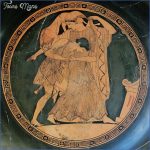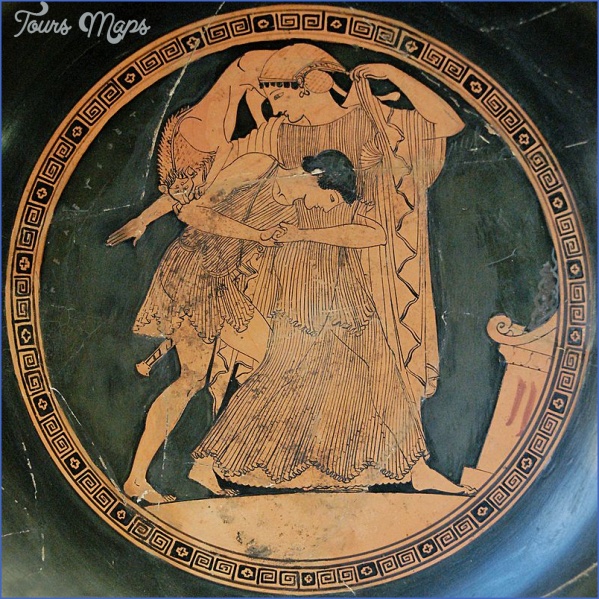Peleus, a prince from Phthia, further south on the Gulf of Pagasae, was another of the Argonauts.
Acastus’ wife, Cretheis, fell in love with him and, when he rebuffed her, accused him of rape. Rather than executing him, Acastus took Peleus hunting on Mount Pelion, hoping to find an excuse to kill him In fierce competition, the two bagged a prodigious haul, but at sunset, to provoke a fight, Acastus claimed all Peleus’ trophies as his own. Peleus protested. He had cut out all his victims’ tongues and now exhibited them as evidence. Afer an uneasy banquet, Peleus fell asleep. When he awoke Acastus had disappeared, taking Peleus’ weapons, and now a herd of Centaurs was surrounding him, hungry for revenge for the carnage of the day before. Only just in time Cheiron galloped up and diffused the situation.
The Wedding of Peleus & Thetis Photo Gallery
Cheiron knew that Zeus wished Peleus to marry the sea-nymph, Thetis. (The only reason Zeus had not slept with her himself was that Thetis’ son was destined to be stronger than his father.) But Thetis was unwilling to mate with a mere mortal, and when Peleus found her basking in a cave she did her utmost to resist him, turning herself first into fire, then water, a serpent, a lion and a cuttlefish. Peleus clung to her until Thetis conceded defeat.
Their marriage was celebrated near Cheiron’s cave. It was a lavish ceremony. The Muses sang, the Nereids danced and the Centaurs watched in wonder. But as the festivities reached their peak, an icy chill descended. Dressed all in black a figure stalked into the glade. It was Eris, goddess of strife, whom Peleus had forgotten to invite. Now she exacted vengeance. Taking a golden apple from beneath her cloak, she rolled it across the dancing floor. Then, wordlessly, she turned and strode away.
The battle between the Centaurs and Lapiths formed the subject matter for metopes on the south side of the fifth-century BC
Parthenon at Athens.
The apple bore an inscription: ‘for the most beautiful’. Now every woman, nymph or goddess claimed it for her own and the feast degenerated into acrimony. Only after many years would the apple find an owner, when Zeus commanded Paris to make a judgment on Mount Ida, the consequence of which would be the fall of Troy.
Maybe You Like Them Too
- Theseus & Peirithous
- The Voyage of the Argo Begins
- Minos, his Loves & his Family
- The Centaurs
- Athens in History & Today












